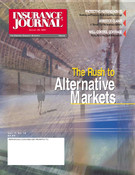Houston-based U.S. District Judge David Hittner issued a ruling Aug. 8 conferring class action status on a lawsuit involving claims of overcharging for workers’ compensation coverage by Reliance National Indemnity Insurance Company and around 150 other insurers, opening the door for nearly 10,000 businesses to join in the litigation.
The lawsuit was originally filed in Houston in 1998 under the federal Racketeer Influenced and Corrupt Organizations Act (RICO). Sandwich Chef of Texas, doing business as Wall Street Deli, alleged that Reliance and other insurers schemed to defraud employers by invoicing them for premiums in excess of state filed rates and conspired to conceal their misconduct from state regulators. The suit contends that the defendant insurers committed racketeering acts in order to defraud a class of insureds through a common scheme of mail and wire fraud.
The lawsuit seeks to recover RICO damages for Wall Street Deli, and other employers who purchased workers compensation insurance in one or more of 44 states and the District of Columbia on or after Jan. 1, 1987. Under the RICO statute, damages awarded could be three times actual damages.
In the lawsuit, Wall Street alleged the insurers acted in collusion with the National Council on Compensation Insurance Inc. (NCCI), a private trade organization established and controlled by the defendants, to submit incorrect rate filings and mislead regulators. In many states NCCI serves as the official ratings organization. It also files insurers’ proposed rates, policy forms and manuals for the approval of state regulators.
Wall Street and other plaintiffs purchased retrospectively rated workers’ compensation insurance on the voluntary market, policies that take into account the insured’s covered losses during the policy period and adjust the premium up or down according to the loss experience. NCCI filed insurers’ retrospectively rated policies with state regulators and was responsible for verifying that the insurers’ actual retrospective plan factors conformed to state-approved plan factors.
However, Wall Street contended that during the named time period, NCCI and the defendants knowingly submitted filings that were meant to mislead regulators into believing that the rates charged by the defendants were filed rates, when they were actually charging policyholders additional and unfiled residual market subsidies. In addition, NCCI also allegedly supported the defendants’ scheme by distributing information used by insurers to set unauthorized charges and by facilitating meetings and discussions for the purpose of furthering the scheme.
The lawsuit has weathered several attempts by defendants to have the case dismissed, and in August 2000, Judge Hittner denied a motion for a summary judgment against the plaintiffs. Among other things, the defendants asserted that federal and state laws presume that policyholders “know the contents and effects of applicable filed rates”; therefore, stated the insurers, the plaintiffs can not successfully argue that they relied on alleged misrepresentations on insurers’ invoices in assuming that the charged rates conformed with applicable filed rates. They also argued that Wall Street was unable to prove that the defendants violated the mail and wire fraud statute and insisted that misrepresentations made in invoices do not constitute fraud. The insurers argued against class action status by asserting, among other things, the potential plaintiffs’ circumstances are too different in most cases to allow them to qualify to join a class action suit.
The determination of class action status relies on the plaintiff’s ability to meet four established requirements: numerosity, commonality, typicality and adequacy. The defendants conceded the first requirement – numerosity – which is the determination of whether the class is too numerous to be handled in a practical manner. The judge determined that Wall Street had established commonality by a showing the existence of a number of legal and factual issues common to the potential plaintiffs, including the allegation that the defendants were involved in an underlying scheme to defraud the class.
The third requirement – typicality – requires that the claims of named and unnamed plaintiffs have a common source and rely upon the same legal foundations. In contemplating typicality issues, the judge found that “the alleged injuries to the class of members, including Wall Street, have a common source: the alleged conspiracy to corrupt NCCI, to deceive state regulators, and to overcharge policyholders through fraudulent billings. This alleged collusion creates typicality.” Judge Hittner also determined that the plaintiffs’ claims were being made under a single statute, “RICO, with predicate acts of mail fraud and wire fraud.”
The judge dismissed the defendants’ arguments against Wall Street’s adequacy to represent the class as a whole, including unnamed members. The insurers asserted that Wall Street’s decision to file the claim under RICO would prevent absent class members from asserting other claims and would create an intraclass conflict. Citing a recognition by the Supreme Court that class members are not prevented by judgments on class-wide claims from submitting subsequent claims based on other legal theories, Judge Hittner found that no such conflict existed. The judge also noted that through a proposed Trial Plan, Wall Street has sufficiently addressed many of the issues concerning the management of the case.
In conclusion, Judge Hittner offered the opinion “that class action – rather than innumerable individual actions – was a better method of litigating the dispute.” In granting the motion, Hittner stated the Court would keep in mind “the existence of Wall Street’s Trial Plan to manage the case, the Court’s ability to divide the class into subclasses at a later date if appropriate, and the appointment of a special master if warranted.”
Scott Clearman, lead attorney for Wall Street, said the suit would go forward with the plaintiffs joined in a single case. Notice of the class action lawsuit is expected to be distributed with an invitation for potential plaintiffs to join in.
Topics Lawsuits Carriers Fraud Claims Workers' Compensation Talent
Was this article valuable?
Here are more articles you may enjoy.


 Chubb Posts Record Q4 and Full Year P/C Underwriting Income, Combined Ratio
Chubb Posts Record Q4 and Full Year P/C Underwriting Income, Combined Ratio  Former Ole Miss Standout Player Convicted in $194M Medicare, CHAMPVA Fraud
Former Ole Miss Standout Player Convicted in $194M Medicare, CHAMPVA Fraud  India’s GIFT City Attracts Lloyd’s and Other Global Reinsurers, Sources Say
India’s GIFT City Attracts Lloyd’s and Other Global Reinsurers, Sources Say  Beazley Agrees to Zurich’s Sweetened £8 Billion Takeover Bid
Beazley Agrees to Zurich’s Sweetened £8 Billion Takeover Bid 


